How to Edit Photos Without Photoshop: 12 Alternatives to Try
Although Photoshop is considered the gold standard of the industry and has even become synonymous with photo editing itself, this program still has its disadvantages: it takes forever to learn how to use it, the subscription is rather costly, and powerful hardware is required. These limitations might naturally make you wonder, how to photoshop without Photoshop?
We’ll show you some of the best desktop photo editors that are easier to use and cheaper in comparison to Photoshop. We’ll also introduce to you a handful of mobile apps and online platforms that can easily replace Photoshop for common editing tasks. What’s more, we’re going to guide you through the editing process in one of those programs. This article covers some popular techniques, but it’s also possible to perform more sophisticated tasks. For example, you can:
— Do a face swap without Photoshop
— Add someone into a picture without Photoshop
— Cut out a part of an image without Photoshop
— Put a logo on a picture without Photoshop
— Cut someone out of a picture without Photoshop
Whether you're a seasoned photographer looking for a change or a beginner eager to take your photos to a new level, this list of Photoshop alternatives offers a variety of tools and features to help you bring your creative ideas to life. So, it's time to roll up your sleeves and discover some cool apps to check out.
How to Edit a Photo Without Photoshop: Desktop Programs
Photoshop is a legendary program, but, luckily, not the only tool in the game. There are many desktop photo editors offering similar functionality and artistic freedom. We’ve hand-picked several go-to programs that allow you to edit your pictures just like in Photoshop. Let’s see which option works best for you.
- GIMP
If you want to transform your photos for free, consider trying GIMP, an open-source photo editor suitable for experienced users. Its comprehensive toolset includes essential features like layers, masks, filters, and brushes, so you can perform intricate edits and adjustments with precision. This software is compatible with Linux, macOS, and Windows. However, GIMP's performance on larger and more complex projects can sometimes be slower compared to Photoshop, especially when processing high-resolution images or multiple layers. - PhotoWorks
Another desktop photo editor that is available for Mac and Windows is PhotoWorks. Its simplicity and pro-level tools make it a compelling option for both amateur and professional users alike. With it, you can easily correct colors, remove unwanted objects, change the background, dehaze images, and fix the composition of a photo. There’s also an extensive set of AI-driven retouching tools for removing skin blemishes and reshaping face and body parts. PhotoWorks comes with a collection of presets, textures, and 200+ filters and 3D LUTs. Besides, it lets you process a majority of file formats: edit a PNG file, a JPEG image, pictures in 450+ RAW formats, and more. - inPixio Photo Studio
To make quick edits on a computer, you can use inPixio Photo Studio. This photo editor provides a range of essential features like cropping, resizing, and rotating for composition adjustment. There’s also a variety of filters and effects to add creative touches to your photos, from vintage styles to artistic enhancements. However, inPixio Photo Studio lacks some of the advanced features available in Photoshop: content-aware fill, 3D editing, masking, etc. So it’s more suitable for beginners or casual users who require basic editing capabilities. - PhotoScape
You can also substitute Photoshop with PhotoScape. The software lets you create collages with multiple photos, edit a group of images simultaneously, resize and rotate pictures, and adjust such settings as brightness, contrast, saturation, and sharpness. It also offers a wide range of filters and effects, such as Vintage, Black and White, and Sepia. However, PhotoScape has a clunky interface, and the functionality of the program is rather limited.
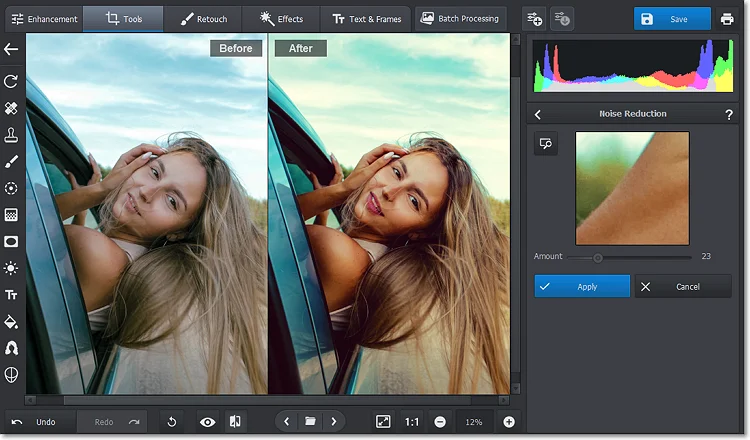
Give your shots a polished look with a desktop Photoshop substitute
Looking for powerful photo editing software that is compatible with macOS? You'll find plenty of options in this article about the best photo editors for MacBook Air.
How to Edit Pictures Without Photoshop: Mobile Apps
When it comes to editing photos on the go, having a handy mobile alternative to Photoshop can be a lifesaver. While the market is loaded with mobile apps, few of them can actually provide you with professional-grade results and run smoothly on your device. But we’ve got you covered. We’ll show you 4 photo editors that won’t let you down. Let’s find out which app can help you edit images right from your smartphone.
- Snapseed
If you need an easy-to-use app, you should try Snapseed. This is a powerful photo editing app known for its user-friendly interface and extensive editing tools. With Snapseed, you can adjust exposure, color balance, and overlay images using the Double Exposure feature. One of its standout features is the selective editing tool, which allows you to apply edits to specific areas of your image. Additionally, Snapseed offers a range of creative filters: Noir, Grunge, Drama, Pop, and so on. But keep in mind that even though the app provides many advanced features like curves and perspective correction, it still lacks some of Photoshop’s tools, such as layers, selection tools, etc. - Afterlight
One more option to check out is Afterlight. It offers a variety of tools, including basic adjustments like brightness, contrast, and saturation, as well as more advanced features like curves and selective colors. Afterlight also provides a wide range of filters, textures, and light leaks to add unique touches to your photos. The app's intuitive interface and easy-to-use tools make it a favorite among mobile photographers. - VSCO
One of the most popular apps for mobile photo editing is VSCO. The app's minimalistic interface and extensive selection of high-quality presets allow you to achieve professional-looking results with just a few taps. VSCO also offers advanced editing tools such as exposure, temperature, and skin tone adjustments. It also provides a community platform for sharing photos with other users. But there’s a drawback you should consider before downloading the app - you can’t use it without signing up for a VSCO account. - Picsart
Another viable Photoshop alternative to try is Picsart. The program offers both basic and advanced features - you can adjust settings like brightness and contrast, use curves, edit the background, and correct the perspective. There’s also an embedded collection of stickers, frames, and backgrounds that you can add to your pictures. Besides, Picsart has AI-driven tools that let you instantly improve the quality of photos, apply filters, replace parts of images, and even generate an avatar.
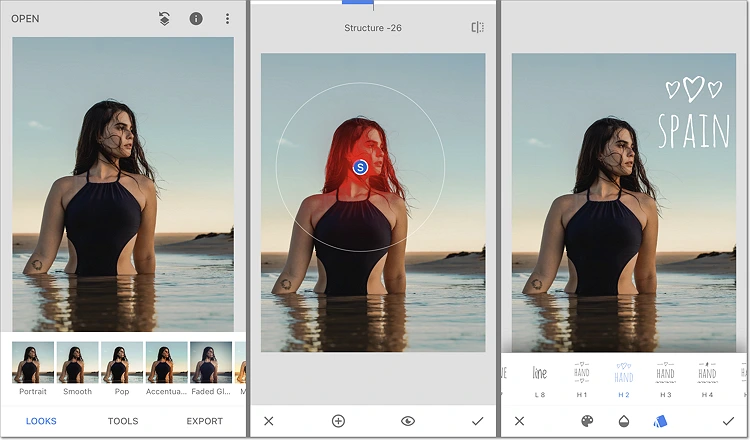
Edit pictures on your smartphone
How to Photoshop Without Photoshop: Online Services
If you want to level up your photos without having to download anything on your computer or phone, don’t hesitate to try online photo editors. Browser-based services are accessible from any device with a stable Internet connection. They also make it easier for you to collaborate with others and share your images directly on social media platforms. So why not give them a shot? These are some of the online services you might like.
- Photopea
To modify your images for free, you can use Photopea. There are lots of useful editing tools, including brushes, selection tools, adjustment layers, and layer masks. This photo editor has an interface that is quite similar to Photoshop which will make it easier for you to transition to Photopea. It allows you to edit a JPG file without Photoshop as well as XCF, Sketch, and even PSD files if you’d like to continue working on your previous projects. - BeFunky
If you’re seeking ease of use and automatic tools, go for BeFunky. With this photo editor, you can enhance image quality, correct colors, balance exposure, and sharpen blurry images with just a few clicks. BeFunky also has advanced features like lens blur for creating a bokeh effect and a denoising tool for improving the visual quality of your photos. This online photo editor is also suitable for creating photo collages and retouching selfies and portraits. - Fotor
Another web-based platform for photo editing is Fotor. It has a huge suite of retouching tools: getting rid of wrinkles, removing blemishes, teeth whitening, correcting the red eye effect, and more. Fotor also lets you quickly change the background, crop and resize photos, add text captions, and overlay images. However, there are limited export options, which might be a disadvantage for you if you need specific file formats for your projects. - Canva
One of popular solutions you might have heard of is Canva. This is graphic design software that also provides some handy photo editing features: cropping, blurring, applying filters, adjusting brightness, contrast, and other settings. This platform has an intuitive interface that even non-experienced users can master right away. If you want to create social media graphics and presentations, you might also like Canva's extensive library of templates, graphics, and fonts. But keep in mind that the free version has limitations in terms of export formats and cloud storage.
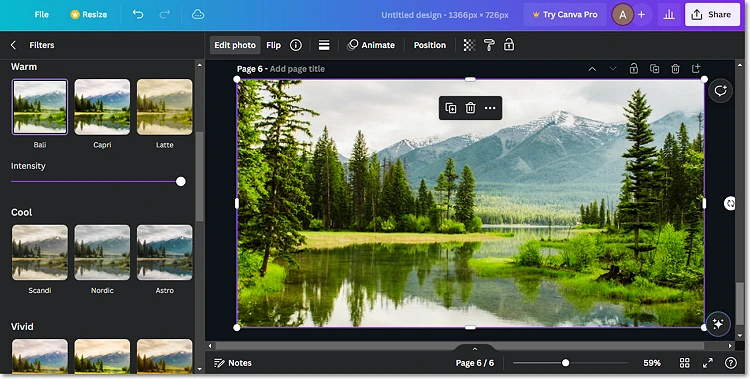
Use web-based tools to edit pics on any device
How to Edit Photos Without Photoshop: 5 Best Ways
There are a couple of useful hacks that can help you improve the look of any photo, be that a portrait, a landscape, or a casual group photo. We’ll show you 5 common editing techniques using one of the programs we’ve mentioned above - PhotoWorks. Before we get into the details of image enhancement, it's better to arm yourself with the tool so that you can try out the tricks in practice right away. So, let’s install the photo editor and get started.
Way 1. Fix the Composition
By fixing the composition, you can eliminate distractions, draw attention to specific elements of a photo, and create a sense of balance and harmony. You'll find some composition adjustment features in Photoshop, but its alternatives offer more convenient tools. Let’s take a look at 2 effective ways to correct the composition in your images with PhotoWorks.
1. Crop the Picture
To remove unwanted parts of your picture, you need to use the Crop tool. You can either use a custom aspect ratio or select one of the ready-to-use options: 1:1 Square, 16:9 HD, 9:16 iPhone, etc. This will help you prepare the picture for sharing and avoid black bars when viewing it on a desired screen. PhotoWorks also offers a variety of grids that help you crop the picture according to common composition rules, including Golden ratio, Rule of Thirds, Triangle, and so on.
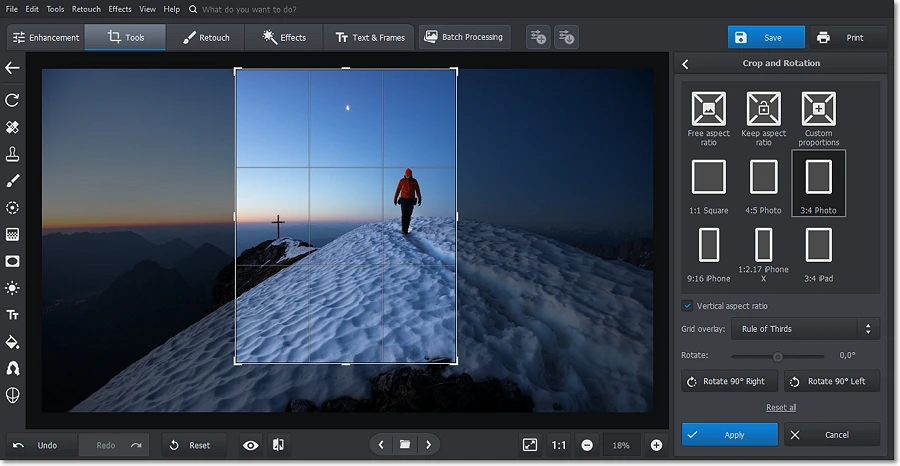
The right composition can do wonders to a picture
2. Straighten the Horizon
To fix a slanted photo, you should slightly rotate it. Just drag the slider to the left or right and move the selection and handles to keep the area you need.
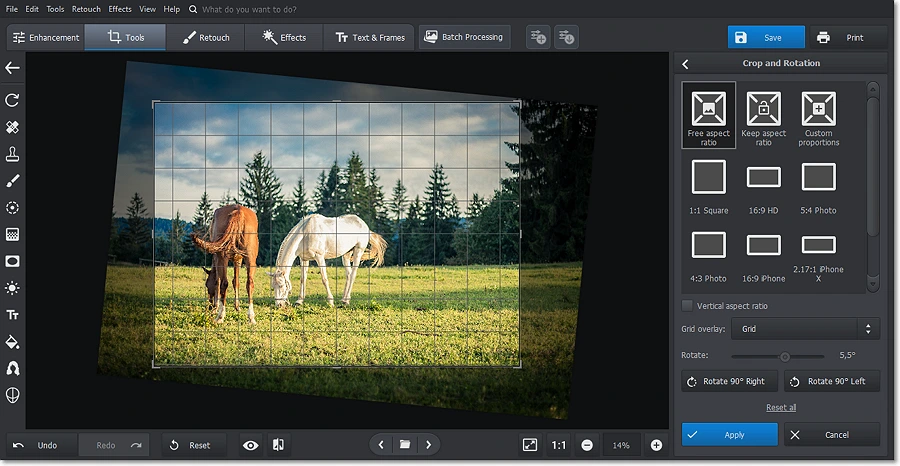
Correct the horizon in your photo
Want to try other ways to straighten the horizon in your pictures? Follow this link to find shooting tips for fixing the horizon and learn more about how to make a slanted picture straight in post-production.
Way 2. Adjust the Color Balance
When editing a picture, you should also adjust the colors in it. There are two ways to deal with them: color correction and color grading. Let’s see how you can perform these tasks with Photoshop's precision using several editing tools in PhotoWorks.
1. Color Correction
Color correcting tools are used to fix colors and bring back the natural look of the image. For this job, you can use the HSL (Hue, Saturation, Luminance) sliders and RGB curves. PhotoWorks also offers an Auto Correction feature to fix colors in one click.
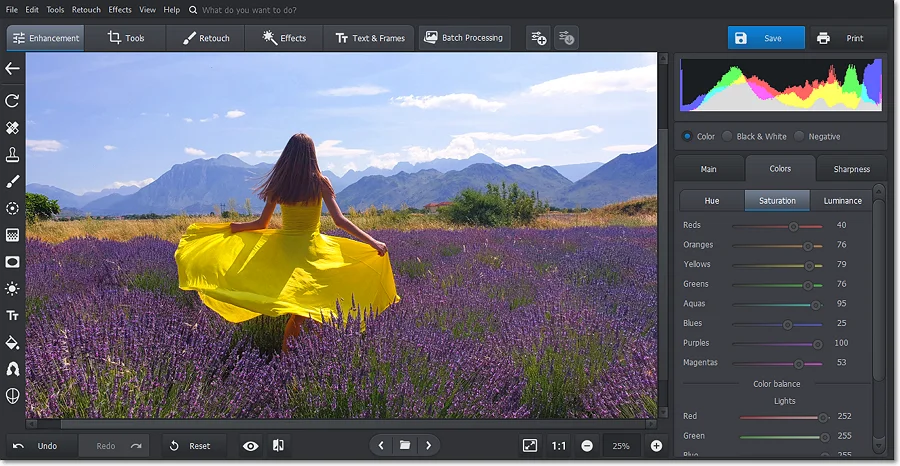
Adjust the colors to give your image a better look
2. Color Grading
While color correction helps you fix mistakes, color grading is more about stylizing your shots. PhotoWorks is rich in features that can be used for this. For example, you can apply over 200 filters, 3D LUTs, and Lab Colors to instantly stylize a picture. Another way to tweak the colors in a photo is by using the Tone Mapping tool.
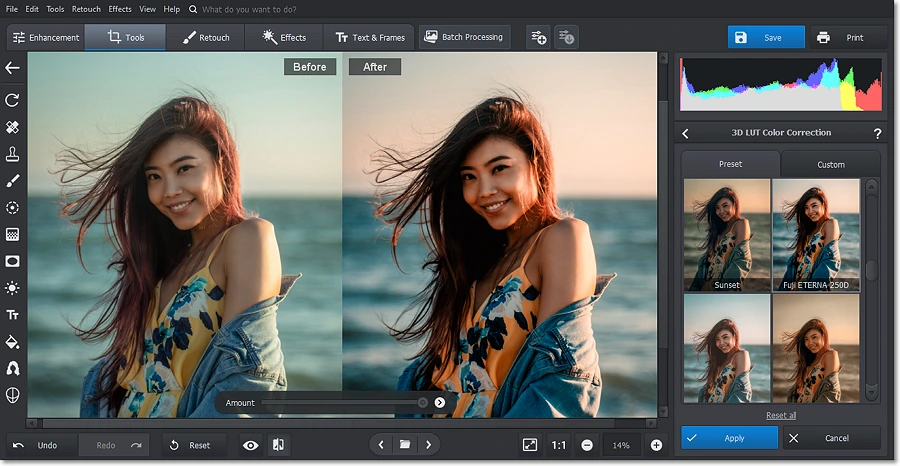
Stylize pictures with the best color grading tools
Way 3. Edit the Background
Photos can often get ruined by strangers or buildings in the background. Sometimes the background itself might look dull or distracting. But you can easily get rid of unnecessary parts of the photo or completely replace the background with another. Here's how you can do it without the complexity of Photoshop.
1. Erase Unwanted Objects
For removing objects or people from the background, selection tools will come in handy: Patch for major objects or Clone Stamp and Healing Brush for smaller parts of a photo. While Healing Brush seamlessly blends the selected segment in the picture, Patch and Clone Stamp let you replace it with another area.
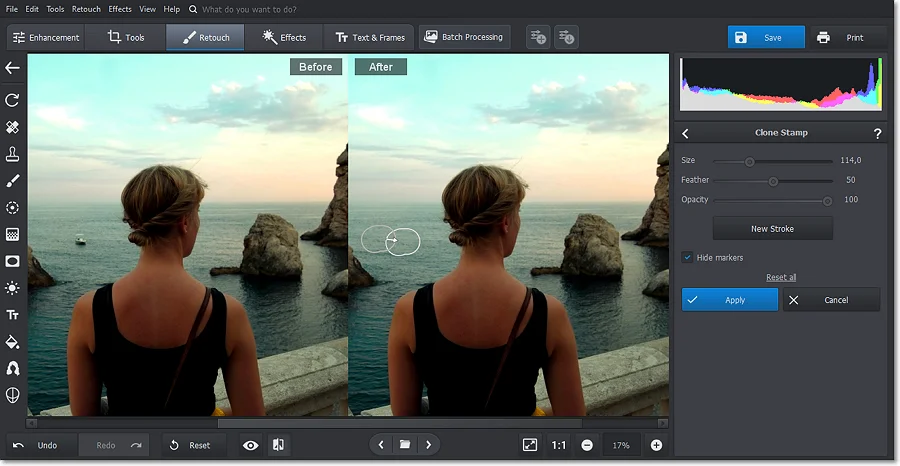
Remove any distractions from a photo
2. Add a New Background
To swap the backgrounds, you can use the AI-powered feature. You’ll only need to select the backdrop and foreground areas using the Background and Object brushes, with no need to do it precisely. The program will automatically remove the background, and then you can add a new one from the collection of background images or upload your own file.
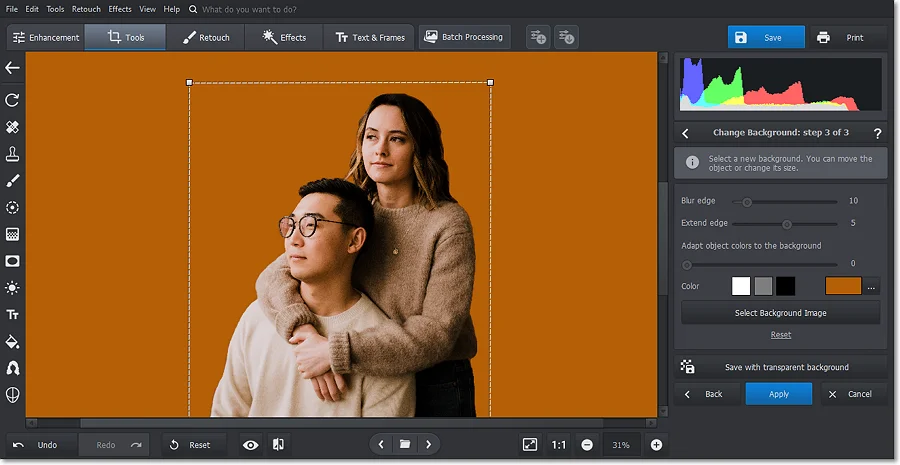
Replace a mediocre background with a studio backdrop
If you need to replace the background color with another, you can do it in mere seconds with PhotoWorks. Use the link to learn how to change the background color of a picture in just a couple of clicks.
Way 4. Sharpen Your Photo
Pictures often turn out to be a little blurry. To make them look clear, you can use various sharpening tools. Some of them are aimed at adjusting specific areas of a photo, others help you edit the entire image. Let’s see how you can sharpen your pictures with a Photoshop alternative.
1. Fix Blurry Parts of a Photo
To make local adjustments, you can use such tools as Adjustment Brush, Radial Filter, and Graduated Filter. After you make the selection of the blurry area, you need to switch to the Sharpness tab and tweak the Sharpen, Radius, and Threshold values by dragging the sliders. And it’s done.
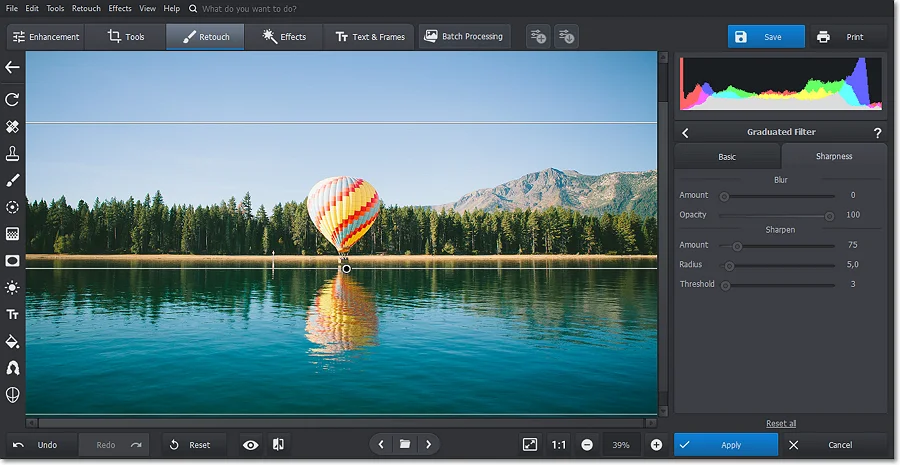
Get rid of blurry parts of a picture
2. Sharpen the Whole Image
If it’s not just a part of a photo but the entire image that is blurry, correct it by adjusting the Clarity setting. We recommend you set it around 70. Alternatively, you can make your picture look clear using the Sharpness tool - change the Sharpen, Radius, and Threshold values. But don’t overdo it and sharpen the image just slightly to keep a natural look.
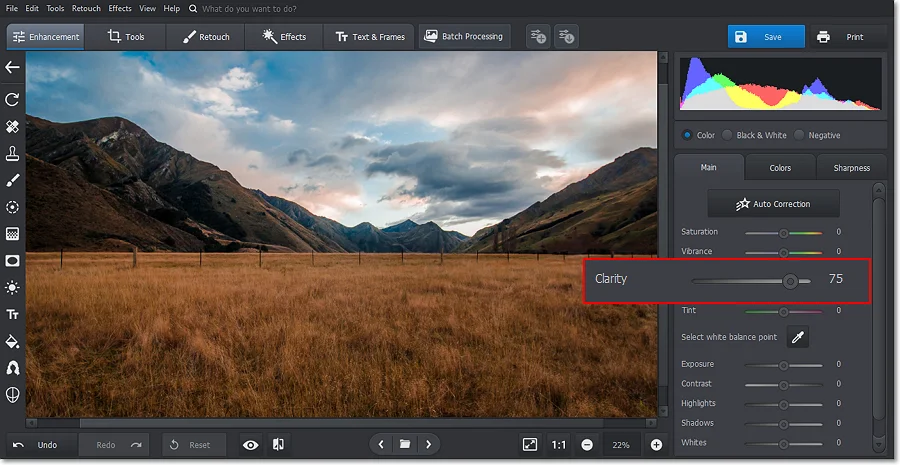
Enhance the clarity of your photos in a flash
Way 5. Touch Up Portraits
Photoshop is also commonly used for retouching portraits. However, its alternatives offer much easier ways to enhance such photos. Below, we’ll share a few retouching ideas to help you create magazine-worthy portraits with an AI-driven portrait editor.
1. Perfect the Skin
To make the skin look flawless in a photo, you can use selection tools like Clone Stamp, Patch, and Healing Brush. But PhotoWorks also offers automatic tools and presets for quick skin enhancement. For example, the Skin Defects Removal feature lets you smooth the skin without having to select the imperfections - just drag the slider, and they’re gone.
The Portrait Magic module also allows you to edit the face and neck skin either using the ready-made presets or moving sliders: eliminate acne, remove glare and redness, adjust the skin tone, etc.
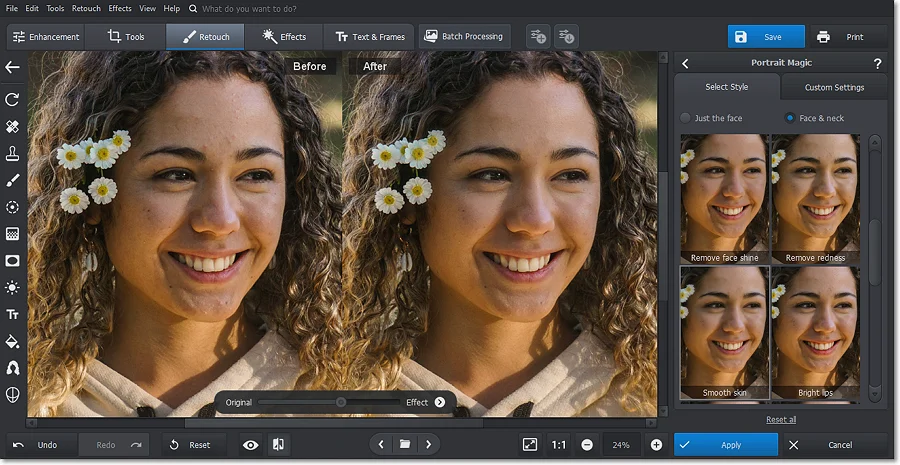
Remove skin blemishes w/o Photoshop
2. Edit Facial Features
Photoshopping faces sounds like a difficult thing to do, but with the power of AI technology, it’s become accessible to everyone. For instance, the Face Sculpt feature in PhotoWorks detects facial features all by itself, so all you have to do is drag the sliders to change the eye size, plump the lips, reshape the eyebrows, or make the nose smaller.
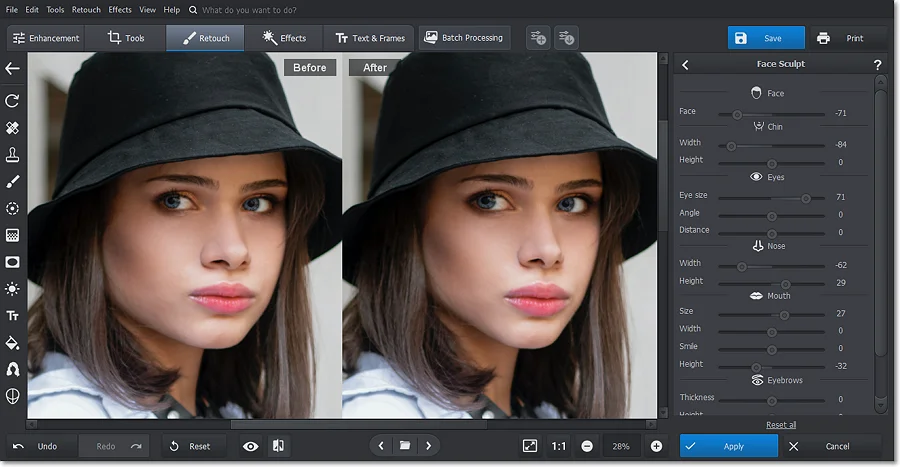
Edit selfies and portraits with ease
3. Transform the Body
Another popular task that you can effortlessly carry out with PhotoWorks is editing the body shape. The Body Sculpt module provides a handful of reshaping tools for slimming the waist, enlarging body parts, changing the legs, and more. There’s also the Reshape feature that allows you to shrink, move, and enlarge the selected areas as well. The process is quite simple: you only need to place the handles over the desired part and move the slider.
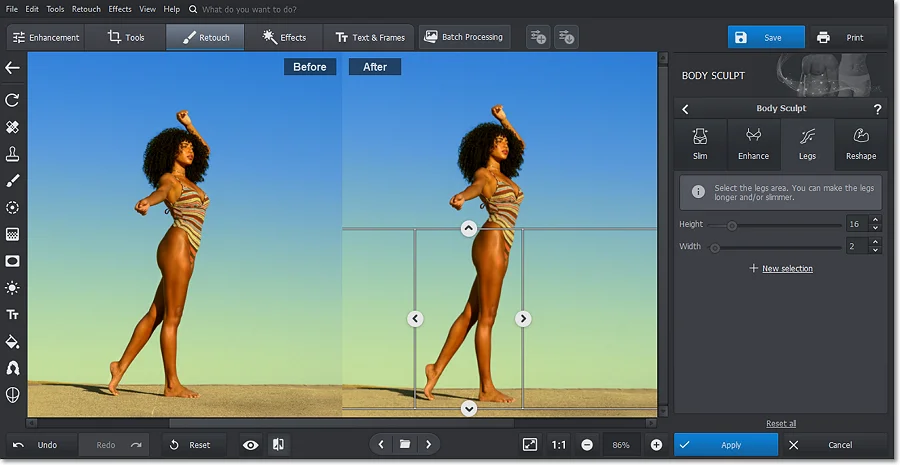
Try this easy-to-use body editing tool
Editing Photos Without Photoshop: Summary
Now you know 12 Photoshop alternatives that will help you save money, effort, and time. First, you’ve discovered desktop photo editors suitable for different levels of skill. Then you’ve explored several mobile apps available for iOS and Android. Finally, we introduced online platforms to enhance pictures on any device.
You’ve also found out how to photoshop a picture without Photoshop using 5 common techniques. We showed the process using one of the desktop programs - PhotoWorks, powerful software for all-round editing. So, with so many ideas for how to polish your photos and a bunch of programs to bring them to life, you can get started and see them in action right away.

